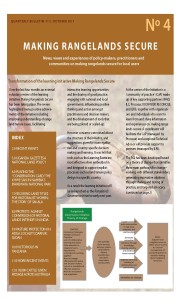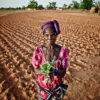Land Portal: Making Rangelands Secure – Quarterly Bulletin No.4 2013
 As seen on Land Portal’s Quarterly Bulletin
As seen on Land Portal’s Quarterly Bulletin
Over the last four months an external voluntary review of the learning initiative: Making Rangelands Secure has been taking place. The review highlighted many positive achievements of the initiative including improving understanding of rangeland tenure issues, facilitating interactive learning opportunities and the sharing of good practice, engaging with national and local governments, influencing positive thinking and action amongst practitioners and decision makers, and the development of tools that are being piloted or scaled-up.
However concerns were raised about the structure of the initiative, and suggestions given for more egalitarian and country-specific decision making and learning. It was felt that tools such as the Learning Route are most effective when embedded in and designed to support explicit processes such as land tenure policy design in a speci”c country.
As a result the learning initiative will be re-launched as the Rangelands Governance Initiative early next year.
At the centre of the Initiative is a ‘community of practice’ (CoP) made up of key supporting partners (IFAD, ILC, Procasur, IUCN-WISP, RECONCILE, and ILRI), together with organisations and individuals who want to learn from and share information and experiences on, making range lands secure. A coordinator will facilitate the CoP (managed by Procasur) and a regional Technical Advisor will provide support to partners (managed by ILRI). The RGI has been developed based on a theory of change that identities three main pathways for change – working with different stakeholders, generating innovative solutions through sharing and testing of practice, and targeted advocacy.
The Rangeland Governance Initiative currently focuses on “ve countries – Kenya, Tanzania, Uganda, Ethiopia and Sudan. In each country partners will develop a set of activities that reject a country-specific theory of change to make rangelands more secure. Each country-based programme is expected to access its own funding for activities. Thematic programmes such as women’s land rights, will also be established. Sharing of information and experiences across the countries and beyond, together with the thematic areas, will be facilitated through the CoP, which will also link with networks and forums that focus on related issues. Support to and linkages with regional and continental bodies such as IGAD (Intergovernmental Authority for Development), EAC (East Africa Community), and the African Union will also be developed.
Read full bulletin here!


